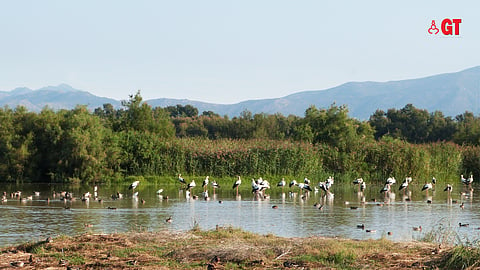

In vibrant Goa, where lush landscapes meet the glistening waters of the Arabian Sea, encounters with wildlife have become increasingly commonplace.
First, it was leopards prowling on the roads, and now, the spotlight has shifted to crocodiles. A recent incident near a pond in Santa Cruz has reignited concerns about the coexistence of humans and these reptiles.
This marks the second sighting of a massive crocodile in the area, raising safety alarms among locals and commuters, alike.
As we grapple with these encounters, it becomes imperative to delve into the underlying issues that contribute to such incidents, particularly the encroachment of human activities on the natural habitats of these awe-inspiring creatures.
MAN-ANIMAL CONFLICT IN GOA
The recent sighting of the massive crocodile near a pond in Santa Cruz underscores the escalating issue of wildlife conflict in Goa. It is worth noting that this isn’t the first time such an incident has occurred at this particular spot.
Forest Department officials had previously intervened to rescue a crocodile in the same vicinity.
These encounters serve as a stark reminder of the pressing need to address the underlying causes that lead to such conflicts, ultimately jeopardizing the safety of both humans and crocodiles.
One crucial aspect of alleviating human-crocodile conflict lies in respecting the territorial rights of these reptiles.
RESPECTING TERRITORIAL RIGHTS
One crucial aspect of alleviating human-crocodile conflict lies in respecting the territorial rights of these reptiles. Crocodiles, as apex predators, play a vital role in maintaining the ecological balance of wetland ecosystems.
However, as human activities encroach on these natural habitats, the territorial boundaries of crocodiles are increasingly compromised.
Respecting these boundaries becomes paramount in reducing the chances of conflict between the interests of humans and these remarkable reptiles.
ENCROACHMENT & DESTRUCTION OF WETLANDS
Wetlands, such as Carambolim Lake, Chorao Island, Selaulim Reservoir, Anjuna Reservoir and Mayem Lake, among others, are essential to the survival of crocodiles. Unfortunately, these vital habitats are under threat due to human encroachment.
The expansion of urbanisation and construction of houses in and around wetlands not only shrinks these areas, but also escalates the likelihood of human-crocodile contact.
The delicate balance between human and fauna interests is most precarious in these wetland ecosystems, posing a challenge that demands urgent attention.
The expansion of urbanisation and construction of houses in, and around, wetlands not only shrinks these areas, but also escalates the likelihood of human-crocodile contact.
The conflict between humans and crocodiles is exacerbated by the relentless encroachment of human activities into wetlands.
As these ecosystems face the brunt of urbanisation, the natural habitats of crocodiles are disrupted, pushing them into closer proximity to human settlements.
The construction of houses and infrastructure, often overlooking the ecological significance of wetlands, poses a severe threat to the delicate balance that sustains both humans and wildlife.
CALL FOR CONSERVATION
World Wetlands Day, observed annually on February 2, serves as a poignant reminder of the critical role wetlands play in sustaining life on Earth.
It is a day dedicated to raising global awareness about the vital importance of wetlands for people and the planet.
In the context of Goa, this day takes on added significance as it highlights the urgent need for conservation efforts to protect the delicate ecosystems that are home to species like crocodiles.
Conservation initiatives should not only focus on preserving the habitats of crocodiles, but also on educating the public about the importance of coexisting harmoniously with these ancient creatures.
By raising awareness about the ecological significance of wetlands, we can foster a sense of responsibility among the local communities to actively participate in conservation efforts.
By raising awareness about the ecological significance of wetlands, we can foster a sense of responsibility among the local communities to actively participate in conservation efforts.
MINIMIZING CONTACT FOR MUTUAL BENEFIT
While muggers, also known as marsh crocodiles (Crocodylus palustris), are known to peacefully coexist in water bodies shared by humans and cattle, minimizing contact remains crucial to preventing conflicts of interest.
The abundance of fish in certain areas can attract crocodiles, making them susceptible to being considered nuisances.
By implementing measures to minimize contact, we can create a safer environment for both humans and crocodiles, reducing the likelihood of conflicts that could have detrimental consequences for both parties.
As Goa grapples with the dual challenge of wildlife encounter conflicts and the encroachment on vital wetland ecosystems, it becomes clear that urgent and decisive action is needed.
Respecting the territorial rights of crocodiles, preserving their natural habitats and fostering awareness about the importance of wetland conservation are crucial steps toward achieving a harmonious coexistence between humans and these ancient reptiles.
In navigating the wild waters of Goa, we must strive to strike a balance that ensures the survival of both our communities and the remarkable wildlife that share this enchanting landscape.